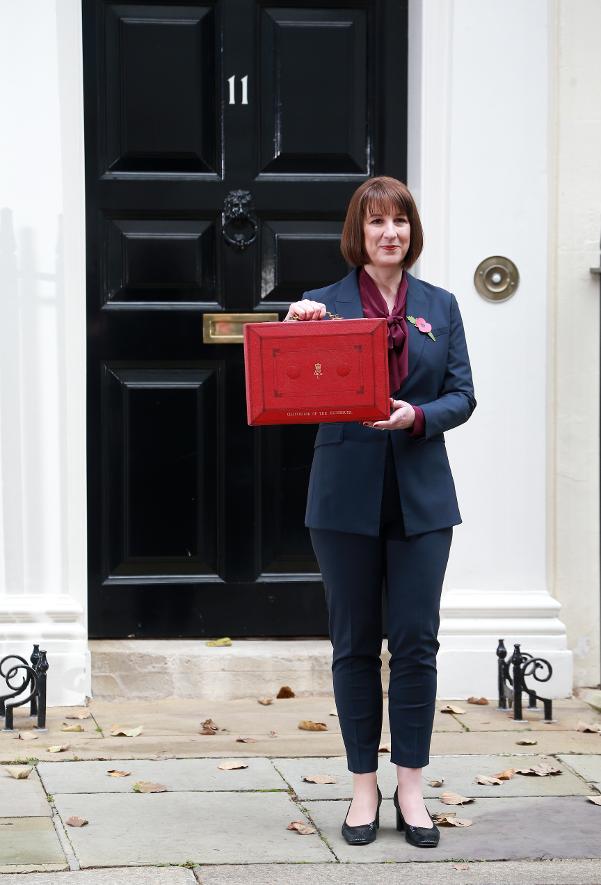




Adapt or die?How change makes or breaks a business
the storiesbehind three of history'sbiggest change management gainsand gaffes.
TUC: Women bearing brunt of exploitative zero-hours contracts
Crucial role for IMFand World Bank in trade conflicts and climate crisis Demand
Regional: West Cumbrian teens


W ill Lab o ur ?s p lan f o r
g r o w t h act u ally w o r k?
Tw o ec o n o m is t s r es p o n d




Phil Tomlinson Professor of Industrial Strategy, Co-Director Centre for Governance, Regulation and Industrial Strategy (CGR&IS), University of Bath
David Bailey Professor of Business Economics University of Birmingham
The UKchancellor Rachel Reeves says the Labour government will go ?further and faster?to kick-start the British economy Economic growth ? to raise living standards and fund public services ? is apparently a core mission of this government.
Yet since the general election last July, this growth has proved elusive
In fairness, the UKeconomy been pretty stagnant for a long time. And as Reeves sometimes mentions, she arguably inherited the worst set of economic circumstances since 1974
Nevertheless, the government has been guilty of some major own goals. The means-testing of winter fuel payments drew derision, while the public framing of a ?painful?budget in October 2024 dented business and consumer confidence.
So after a difficult first six months in office, the chancellor?s big speech on January 29 was an opportunity for a major economic reset And there were some signs of encouragement.
She reaffirmed, for example, a commitment to reforming the UK?s antiquated planning laws for residential and commercial building And there was a big emphasis on public investment, which is to rise to 2.6% of GDP over this parliament, compared to the previous government?s plans of 19%
Airport expansion at Heathrow (and to a lesser extent, Luton and Gatwick) aims to enhance global connectivity and increase trade and investment, especially with emerging economies
But those plans, which run counter to the government?s net zero goals, unsurprisingly sparked the ire of environmental campaigners, as well as some senior Labour MPs and party donors
They may also widen the UK?s regional inequalities, drawing more investment and economic activity to the south-east. The same goes for the notion of building Europe?s ?Silicon Valley?between Oxford and Cambridge
That said, some other regions may benefit


from announcements, which included a £28 million investment in Cornish Metals (for materials for solar panels and wind turbines), and £63 million for advanced fuels, which should bring more high-skilled jobs to areas like Teesside There were also plans for housing and commercial redevelopment around Old Trafford in Manchester
Some of these projects will form part of the government?s new industrial strategy, which is expected in the spring Red tape restrictions
One word to look out for when that strategy is unveiled is ?Brexit,? which continues to act as a drag on the UK?s growth. Yet in her speech, while Reeves used the ?growth? word more than 50 times, she mentioned Brexit just once
It deserves much more attention. For investment in the UKhas been lacklustre since the 2016 referendum, and research shows that post-Brexit red tape has hampered exports, especially for smaller firms. Overall, the UK?s exports of goods are down by 9% since 2020, while similar economies have seen their exports rise by 1%
The chancellor has previously suggested a Brexit ?reset,?and there may be a future deal to ease some Brexit agri-food trade barriers Reeves has also floated the possibility of the UKjoining a ?Pan-Euro?customs zone
Other moves that might help UK manufacturing include a bill that would allow the government to keep pace with new EU product safety regulations, and anything else which avoids new administrative costs for businesses.
Yet despite the government perhaps adopting a more conciliatory tone with the EU, there are frustrations with the UK?s ?red lines,?such as a refusal to agree to a scheme that would make it easier for young EU citizens to travel, work and study in the UK, and for young UKnationals to do the same in EU member states
Execution
And while the chancellor?s speech highlighted the government?s long-term ambitions for growth, there was little to address current weaknesses quickly
For despite a change to Labour?s self-imposed fiscal rules last autumnn, the government still faces significant public borrowing constraints This will restrict the amount of investment required to fundamentally transform public infrastructure, without major private sector support
And planning reforms, infrastructure projects, and new trade deals all take time and face political, legal and logistical hurdles This will also delay growth Labour?s ambitions for a more pro-growth, pro-business agenda mark a positive shift, at least in tone. But actual, visible, tangible growth depends on execution. This in turn depends on private sector money, overcoming bureaucratic hurdles, and cutting the Brexit red-tape that continues to hamper trade with the EU.
Without effective action across the board, including immediate fiscal stimulus, the chancellor?s words may begin to sound a little hollow if the mission for growth soon starts to look like mission impossible.














In this edition, Craig Sergeant of Advance Copy sharesthe stories behind three of business history?s biggest change management gains and gaffes.
Picture this One evening, sometime during the 1970s in Oakland California, two young married couples share dinner in a beautiful home
Maybe there?s a lot of dark wood panelling It?s likely there?s plenty of denim And almost certainly, beneath the scent of the homecooked meal, there?s a layer of lingering cigarette smoke
Tonight?s hosts are an affluent businessman and his wife He?s a brand-new client of a fledgling investment firm ran by their guest, Randall Fields It?s a night of talking finances, deals, strategy Proper Grown-Up Stuff
It?s also a night of getting to know each other on a human level. Randall introduces his young wife, Debbi, and talk turns to her.
The host asks, ?What do you do??
Coming from a humble background and after a few years working as a ballgirl for the baseball team, the Oakland Athletics, Debbi is now a happy housewife who loves baking cookies She replies: ?Oh, I?m just trying to get orientated?
For the host, this clearly does not do.
Without a word, he gets up and takes a huge leather-bound dictionary off the shelf. He thrusts the book at Debbi and sneers, "The word is oriented If you can't speak the English language, you shouldn't speak at all."
Debbi is crushed with embarrassment. Tears stream down her cheeks But as soon as it feels like an emptiness opens inside, an idea starts to form Arealisation She hears her father?s soothing voice in her head. He reminds her of his old saying: ?Wealth means doing something you love?
She recalls: ?And what I loved was cookies So, that night, I gathered myself together and set out to become a somebody.?
Debbi starts a cookie company called Mrs Fields Within a few decades, it?s valued at $450 million Today, it?s even more
Now, while that story reflects certain attitudes and behaviours that are hopefully consigned to history, it shows how turning points can happen to anyone at any time.
Fuelled by the desire to prove the world (and

her husband?s client) wrong, Debbi completely changed the course of her life and livelihood
In business, such levels of major change are inevitable and come in many forms. At any one time, you could deal with demands as disparate as staff turnover, shifting consumer tastes or low confidence in the global economy ? all while trying to keep your business moving forwards.
So, how?s it even possible to manage change when so much of it is out of our control?
At the risk of slightly oversimplifying complexity, it boils down to being proactive or reactive ? and timing it right.
Formed in 1892, Kodak spent more than a century as the industry leader, building an empire based on photographic film
The company?s global success meant that even its marketing slogan, ?Kodak moment,? became a part of people?s everyday language. Whenever something significant, interesting or funny may have happened, that was a Kodak moment ? the perfect opportunity to take a picture.
But in the final quarter of the 20th century, a new threat to their dominance loomed: technology
In Kodak?s favour, they were always proactive They invested huge sums into research and development. They had stunningly accurate market assessments into the risks and opportunities they faced
And despite an internal report in 1981giving them ten years to start pivoting to becoming


a digital-first company, Kodak remained resolute in its commitment to photographic film
So instead, it made baffling products like a film-based camera that showed previews on a digital screen Asort of Frankenstein?s monster that pleased nobody ? why bother with film on a digital camera?Obviously, it bombed.
Eventually, inevitably, Kodak came crumbling down, filing for bankruptcy in 2012
From our present-day vantage point and with the benefit of hindsight, it?s easy to scoff at such demise and lack of foresight. Their proactivity in R&Dmeant they were perfectly positioned to survive and thrive through what would turn out to be humankind?s fastest period of technological advancement
But when organisations are on top for so long, they grow to enormous sizes, which makes it extremely difficult to change course
And when a threat is something brand new, like technology, it?s almost impossible for the swathes of decision makers, stakeholders and shareholders to understand it, let alone agree to the wholesale changes that would save them before it?s too late
It?s only natural for people to understand what they already know ? in Kodak?s case, it was the moneymaker: photographic film
But it all could have been so different After all, the first ever digital camera arrived in 1975. The company that invented it? Kodak. Adapt
Not every business blunders in the face of
change, though
When was the last time you went on YouTube?Probably quite recently, right?

In fact, you might even be on YouTube ? whether starring in your business?s promo videos or as a personality in your own right
But did you know that YouTube was, in its original guise, a dating site?
The idea was for people to upload videos of themselves to appeal to others The site even had a strapline: ?Tune in. Hook up.?
Co-founder Steve Chen revealed how he and
his team started with the output ? video ? and then attempted to reverse-engineer a concept.
?We always thought there was something with video there, but what would be the actual practical application??he said ?We thought dating would be the obvious choice [but] the whole thing didn? t make sense?
Rather than continue to push a failing venture just because they?d already invested heavily in it (a psychological phenomenon called the sunk-cost fallacy), the team at YouTube made a decision to open video

uploads to everyone and see what happens. Success.
The fast pivot allowed users to drive YouTube?s direction, turning it into the video-sharing platform we use today ? the second-most used website on the planet.
Not before the team sold it to Google in 2006 for $165 billion, mind
Of course, that?s not to say that a business needs to change for the sake of it
It?s a fine balance trying to remain ready for anything while avoiding the latest craze or snake oil (remember the metaverse?)
While the examples we?ve looked at have focused on large American companies, the ways to deal with change are universal.
Whether you choose to innovate, diversify, change course or remain the same, you need to time it right to avoid your own Kodak moment But how?
You just have to get orientated. Or oriented. Same thing. Words:Advance Copy

The TUChas warned that women are bearing the brunt of exploitative zero-hours contracts which are ?hindering progress towards gender equality?
New analysis by the union body reveals that women are nearly a third more likely to be on zero-hours contracts than men.
The analysis also shows that:
- Women are overrepresented in eight of the ten occupations with the highest number of workers on zero-hours contracts
- Women are also more likely than men to be stuck on exploitative zero-hours contracts for longer than one year (69%compared to 64%).
- On average, women on zero-hours contracts earn nearly £10 less an hour compared to men not employed on zero-hours contracts
The union body says this stark gender divide is partly the result of women tending to be employed in sectors characterised by high levels of insecurity and high prevalence of zero-hours contracts, such as social care and hospitality.
For example, there are nearly twice as many women working as waiters compared to men ? a profession where 33% of the workforce is on zero-hours contracts
And three-quarters of care workers, the occupation with the second highest number of zero-hours contracts, are female.
BMEand disabled women among most affected groups
Analysis by the union body shows today that BMEwomen and disabled women are among the groups most affected by exploitative zero-hours contracts:
- BMEwomen are 103%more likely than white men to be on zero-hours contracts.
- Disabled women are 49%more likely than white men to be on zero-hours contracts
The union body warns that zero-hours contracts also come with a significant pay penalty
TUCanalysis shows the average zero-hours contract working woman typically earns

around £10/ hour less (£11.80 an hour) than the average man not employed on a zero-hours contract (£2120) But the impact on pay doesn? t stop here
The TUCsays zero-hours contracts give employers complete control over workers? hours ? and therefore pay ? meaning workers don? t know how much they will work and earn each week.
The union body argues that this makes it hard for workers to plan their lives, budget and look after their children
And it makes it harder for workers to challenge unacceptable behaviour by bosses because of concerns about whether they will be penalised by not being allocated hours in future
The transformational potential of the Employment Rights Bill
The TUCsays the Employment Rights Bill ? set to soon return to Parliament for Report stage ? will play a crucial role in securing gender equality in UKworkplaces, as it will:
- Ban exploitative zero-hours contracts ? including introducing right to notice of shifts and compensation for shifts cancelled at short notice
- Secure access to sick pay from day-one.
- Give all workers a day-one right to flexible work
- Introduce mandatory action plans to close the gender pay gap.
- Introduce fair pay agreements in social care
300 women trade union activists from across
the UKare meeting on 5-7March for Women Conference at Congress House, London
Delegates attending the annual event are discussing issues including the rise of the far and populist right and misogyny in workplaces; women?s health at work, and tackling sexual harassment
Among the many challenges women in work face, this year the Conference is also celebrating the opportunities that the Government?s landmark Employment Rights Bill will bring to working women
TUCGeneral Secretary Paul Nowak said: ?Everyone deserves security at work. But exploitative working practices ? like zero-hours contracts ? are holding many people back
?As ever, women workers are bearing the brunt. They are more likely to be concentrated in sectors with endemic levels of insecure work
"The Employment Rights Bill will bring forward common sense reforms to deliver more secure jobs for zero-hours contract workers and help bridge the gap in pay and rights between men and women
"Those defending the broken status quo are opposing access to better jobs for women across the country."
On agency workers being included in the zero-hours ban, Nowak said: "The government is right to close this loophole To properly crack down on exploitative zero-hours contracts, agency workers have to be included Agency workers will now benefit from more security over their working hours and better protections from bad working practices.?

Stuart Mills Assistant Professor of Economics, University of Leeds Richard Whittle University Fellow in AI and Human Decision Making, University of Salford
Before January 272025, it?s fair to say that Chinese tech company DeepSeek was flying under the radar. And then it came dramatically into view.
Suddenly, everyone was talking about it ? not least the shareholders and executives at UStech firms like Nvidia, Microsoft and Google, which all saw their company values tumble thanks to the success of this AI startup research lab
Founded by a successful Chinese hedge fund manager, the lab has taken a different approach to artificial intelligence. One of the major differences is cost.
The development costs for Open AI?s ChatGPT-4 were said to be in excess of US$100 million (£81million) DeepSeek?s R1 model ? which is used to generate content, solve logic problems and create computer code ? was reportedly made using much fewer, less powerful computer chips than the likes of GPT-4, resulting in costs claimed (but

unverified) to be as low as US$6 million, which has both financial and geopolitical effects. China is subject to USsanctions on importing the most advanced computer chips. But the fact that a Chinese startup has been able to build such an advanced model raises questions about the effectiveness of these sanctions, and whether Chinese innovators can work around them.
The timing of DeepSeek?s new release on January 20, as Donald Trump was being sworn in as president, signalled a challenge to USdominance in AI. Trump responded by describing the moment as a ?wake-up call?.
From a financial point of view, the most noticeable effect may be on consumers
Unlike rivals such as OpenAI, which recently began charging US$200 per month for access to their premium models, DeepSeek?s comparable tools are currently free They are also ?open source,?allowing anyone to poke around in the code and reconfigure things as

they wish
Low costs of development and efficient use of hardware seem to have afforded DeepSeek this cost advantage, and have already forced some Chinese rivals to lower their prices Consumers should anticipate lower costs from other AI services too
Longer term ? which, in the AI industry, can still be remarkably soon ? the success of DeepSeek could have a big impact on AI investment.
This is because so far, almost all of the big AI

companies ? OpenAI, Meta, Google ? have been struggling to commercialise their models and be profitable
Until now, this was not necessarily a problem Companies like Twitter and Uber went years without making profits, prioritising a commanding market share (lots of users) instead.
And companies like OpenAI have been doing the same In exchange for continuous investment from hedge funds and other organisations, they promise to build even more powerful models.
These models, the business pitch probably

goes, will massively boost productivity and then profitability for businesses, which will end up happy to pay for AI products. In the mean time, all the tech companies need to do is collect more data, buy more powerful chips (and more of them), and develop their models for longer.
But this costs a lot of money.
Nvidia?s Blackwell chip ? the world?s most powerful AI chip to date ? costs around US$40,000 per unit, and AI companies often need tens of thousands of them. But up to now, AI companies haven? t really struggled to attract the necessary investment, even if the sums are huge
DeepSeek might change all this
By demonstrating that innovations with existing (and perhaps less advanced) hardware can achieve similar performance, it has given a warning that throwing money at AI is not guaranteed to pay off
For example, prior to January 20, it may have been assumed that the most advanced AI models require massive data centres and other infrastructure This meant the likes of Google, Microsoft and OpenAI would face limited competition because of the high barriers (the vast expense) to enter this industry
But if those barriers to entry are much lower than everyone thinks ? as DeepSeek?s success suggests ? then many massive AI investments suddenly look a lot riskier. Hence the abrupt effect on big tech share prices
Shares in chipmaker Nvidia fell by around 17% and ASML, which creates the machines needed to manufacture advanced chips, also saw its share price fall. (While there has been
a slight bounceback in Nvidia?s stock price, it appears to have settled below its previous highs, reflecting a new market reality.)
Nvidia and ASMLare ?pick-and-shovel? companies that make the tools necessary to create a product, rather than the product itself. (The term comes from the idea that in a goldrush, the only person guaranteed to make money is the one selling the picks and shovels )
The ?shovels?they sell are chips and chip-making equipment. The fall in their share prices came from the sense that if DeepSeek?s much cheaper approach works, the billions of dollars of future sales that investors have priced into these companies may not materialise.
For the likes of Microsoft, Google and Meta (OpenAI is not publicly traded), the cost of building advanced AI may now have fallen, meaning these firms will have to spend less to remain competitive. That, for them, could be a good thing
But there is now doubt as to whether these companies can successfully monetise their AI programmes
USstocks make up a historically large percentage of global investment right now, and technology companies make up a historically large percentage of the value of the USstock market. Losses in this industry might force investors to sell off other investments to cover their losses in tech, leading to a whole-market downturn
And it shouldn? t have come as a surprise In 2023, a leaked Google memo warned that the AI industry was exposed to outsider disruption The memo argued that AI companies ?had no moat?? no protection ? against rival models DeepSeek?s success may be the proof that this is true.



Aformer IMFDirector and Nyenrode Business Universityprofessor calls for a newBretton Woodsto prevent economicfragmentation
Economic and political tensions are escalating, the global economy is fragmenting, and climate change is having an increasingly significant economic impact
The world stands at a crossroads where the International Monetary Fund (IMF) and the World Bank can ? and must ? play a crucial role in safeguarding a financially stable global economy
This is the central argument of Prof Dr Paul Hilbers, former Dutch Executive Director at
the IMFand Professor at Nyenrode Business University, in his emeritus lecture in February
International relations are shifting, with far-reaching consequences :
?Firstly, we are witnessing increasing fragmentation of the global economy, where countries prioritize their own interests over international cooperation
"This can lead to trade restrictions, political tensions, and a weakening of the global economy as a whole
"Secondly, we face the growing economic consequences of climate change, including failed harvests, rising sea levels, and



wildfires, which cause significant economic damage,?says Hilbers
He compares the current situation to that of 1944 when the Bretton Woods Agreement was established This agreement created a new international monetary system, leading to the formation of the IMFand the World Bank.
?It?s crucial to remember that the opening of the global economy has raised living standards worldwide, reduced extreme poverty, and increased prosperity and stability. We need a new Bretton Woods moment to avoid taking the wrong path too easily?
Hilbers envisions a pivotal role for the IMF
and World Bank.:
?The two institutions have a global membership, a broad economic and financial mandate, and a strong reputation. Effectively executing this mandate in the current uncertain circumstances is of great importance In addition to the tools they already have for stabilizing the macroeconomy, the IMFand World Bank can also play a significant role in addressing climate change and mitigating its economic impacts This includes advising countries on sustainable economic policies and assisting in the transition to a green economy. They can also support climate adaptation by financing climate-resilient infrastructure and offering guidance on climate investments"



Britain?s unearnedwealthhas ballooned: amodest capital taxcouldhelpavoid austerityandboost theeconomy
Stewart
Lansley Visiting Fellow, School of Policy Studies, University of Bristol
Inheriting the worst set of public finances for decades, Labour was always going to face an uphill struggle trying to fund improvements to the UK?s public services.
Inflated debt and recent hikes in the cost of borrowing mean the government is faced with stark choices For it will be difficult to meet the Chancellor?s own tight fiscal rules without further tax rises or cuts in public spending.
But as the former chief economist at the
Bank of England, Andy Haldane, has warned, further spending cuts would be ?deeply counterproductive?
One solution for avoiding ongoing austerity lies in raising a higher proportion of taxes from assets For despite the UKenjoying a long personal wealth boom, little of this boom is the result of new wealth creation or higher productivity.
Much of it is unearned. Some is the product of corporate wealth extraction, where







dividend payments and personal fortunes have have been prioritised over the long-term health of a company Some privatised water firms, for example, have been turned into cash cows for their owners
Another large part of British unearned wealth is the product of state-induced asset inflation Since 1999, house prices in England have risen almost three times faster than incomes
This kind of asset inflation is a classic example of ?passive accumulation? Or, as the 19th-century philosopher John Stuart Mill described it, getting rich in your sleep
As a result, household wealth currently stands at over six times the UK?s GDP. It was three times in the 1970s
Yet while Britain is asset rich, its tax system is heavily based on earnings from work Taxes on income from dividends, capital gains and inheritance make a tiny
contribution to the public purse.
This is a fundamental flaw of the tax system, which does little to dent the growing concentration of wealth owned by the few Through political inertia, the tax system has failed to catch up with the growing importance of wealth over income
The fallout from the low taxation on wealth is well illustrated by the role of inheritance
Levels of wealth passed on after death in the UKhave been rising sharply Over the next three decades, some millennials are expected to inherit a staggering £5.5 trillion, dwarfing all previous transfers of wealth between generations
The lion?s share of this transfer will go to the most affluent. The lifetime wealth of those with parents in the richest fifth will see their wealth grow by 29% ? compared with 5% for


those born to the poorest fifth.
This will only intensify the reproduction of the wealth divide of the past
Extending the tax base is not just about fairness or revenue raising Asset holdings are often little more than unused resources, while big inter-generational wealth transfers can play a counterproductive role in the economy
Over a third of the UK?s wealth is stored in property (with the rest in pensions, savings and possessions). This is mostly only realised when passed on through inheritance, where its benefits accrue to the already privileged Little of this process contributes to more productive activity, with one of its most malign effects being to fuel higher house prices because the money is largely reinvested in property
The unfairness of inherited wealth has long been recognised The patron saint of economics, Adam Smith called it ?manifestly absurd?
Amodest and phased rise in capital taxation would help to reduce the passive role played by wealth holdings Even small changes would release funds which could be used to improve social infrastructure from schools to hospitals.
One approach would be to build on the existing tax system through higher rates and fewer reliefs and loopholes The second would be to introduce new taxes.
In her first budget, Rachel Reeves took steps
to raise revenue through the first option, from both inheritance and capital gains tax. But these were too modest to alter the overwhelming dominance of tax on earnings
Amore fundamental shift would be to reform the existing system of council tax with a larger number of tax bands at the top Still based on 1991property values, this is perhaps the least defensible tax in Britain
The most effective alternative would be to replace council tax and stamp duty with a single proportionate ?property tax?
Another option would be for a modest annual 1% tax on wealth over £2million, which has the potential to raise around £16 billion a year, or double that on wealth over £1million
Such a measure could be sold politically as a ?solidarity tax?to help pay for the things the UKneeds And while governments have been wary of the political reaction to higher taxes on wealth, the tide is turning.
Those supporting higher taxes on wealth include the Conservative-aligned think tank Bright Blue and an influential campaign group called the Patriotic Millionaires There is also growing public support.
Continued public spending austerity would drive more years of stagnation It would also be politically suicidal for this government, as it was for Labour in 1931and in the 1970s
But harnessing a little more of the country?s immense private wealth would make the tax system more equitable and by providing the resources to boost social investment, ease the path to economic recovery.

While we don? t like to talk about the pandemic much these days, there?s no denying that it changed the way we work ? possibly forever. Five years on, the work-from-home mindset is here to stay ? and for good reason. More people have discovered the benefits of flexibility, reduced commuting and lower costs. The same advantages apply to running a business, which is why home-based franchising is becoming an increasingly popular route to success. With low start-up costs, minimal overheads and high-growth potential, it?s a smart choice for aspiring entrepreneurs Kevin Thackrah, Director of Petpals, discusses why home-based franchising could be the perfect fit for you.
Starting a business can feel daunting, especially when it comes to finances Traditional franchises often require hefty investments in premises, shopfitting and staffing before you even begin A
home-based or van-based franchise, on the other hand, eliminates many of these expenses, making it far more accessible Instead of pouring money into rent and utilities, you can invest in growing your business from day one.
Without rent, business rates or costly office maintenance, a home-based franchise keeps your monthly expenses low ? meaning you get to keep more of what you earn. Many home- or van-based businesses require little more than a vehicle, laptop, phone and internet connection to get started, making them an ideal option for those looking to maximise their profits while keeping their costs to a minimum
There?s a common myth that home-based businesses are small-scale operations with limited room for growth In reality, many franchisees start from home and expand their business over time ? all without needing to invest in costly office space. By

outsourcing tasks, hiring mobile employees or leveraging digital tools, you can scale at your own pace while keeping overheads low.
Hidden financial perks
Running a business from home or operating a mobile business comes with some unexpected financial advantages. A portion of your household expenses ? such as utilities, internet and office equipment ? may be tax-deductible For mobile businesses, costs related to vehicle use ? such as fuel and maintenance ? might also qualify for deductions.
The shift towards remote and mobile services is only growing stronger Consumers are increasingly comfortable with digital interactions and flexible service models, making home-based franchises well positioned for long-term success
With fewer fixed costs and a business model that adapts to modern working habits, home-based franchising is a smart
and sustainable choice for the future So, if you?re looking for a practical, low-risk way to start your own business, a home-based franchise could be the perfect fit.
With lower costs, more flexibility and greater financial control, it offers a clear path to success
At Petpals, franchisees enjoy the benefits of operating from home while building a rewarding pet care business.
Without the financial burden of a physical location, they can focus on what truly matters ? providing top-quality care for pets and exceptional service for their clients
Many franchisees appreciate the work-life balance, lower overheads and strong community connections that come with running a home-based business The world of work has changed ? why not take advantage of it and build a business that works for you?For more information on franchise investment opportunities, visit the PetPals website.

Why are workers so confident?
Data suggests staff remain optimistic despite economic climate.
55% of the workforce remain confident about their job security over the next six months.
50% cited their performance and niche skills as the main driver.
Only 20% indicated jobs confidence is linked to the strength of the industry they are in.
There are stark differences in confidence across regions At the extremes, a 64% confidence rate is the highest in London region versus 46% in

the West Midlands
Workers continue to be optimistic about their job prospects despite the economic climate, but some regions are much more confident than others
That?s according to the latest data from international recruitment expert, Robert Half.
According to a new study from the firm ? carried out by insight agency Opinium between 4th February and 7th February 2025 ? 55% of the workforce remain confident about their job security over the next six months, despite economic headwinds
When asked why, 50% cited their performance and niche skills, while 20% indicated that their industry is growing or in demand, suggesting that ongoing skills shortages and a tight labour market continue to put the power in the hands of highly skilled workers.
While the data reveals that worker confidence is high across the board, the statistics also highlighted regional divides when it comes to worker sentiment
In the London region, 64% of employees are confident in their job security However this falls to 56%in the North West and 46%in the West Midlands.
Matt Weston, Senior Managing Director UK& Ireland, at Robert Half commented:
?The professional services sector continues to experience strong demand for talent, boosting worker confidence despite conflicting economic headlines Our recent Hiring Intentions survey highlights UK
business leaders' plans to increase the hiring of specialised professionals
"According to our data, 82% of businesses plan to make hires in finance and accounting, IT, customer service, and marketing & creative roles across all types of employment (permanent, contract and project based) during the first half of 2025, which in fact is a 5% increase on H2 2024.
"Nonetheless, the regional disparities that we see in worker confidence, likely driven by the availability or lack of nearby opportunities, suggests that the levelling up and growth agenda hasn? t yet created a level playing field across the country.
?The fact that 50% of employees cite their performance and skillset as the main driver for their job security confidence, compared to 20%who mention industry strength, indicates that systemic skills shortages will likely continue shaping a complex labour market in 2025
"In this scenario, candidates, particularly in highly skilled professional services, hold the upper hand in the hiring process Their expertise and in-demand skills give them the power to set expectations, negotiate favourable terms, and choose from multiple opportunities in their career progression.
"Given confident employees and a tight market, employers must adapt their talent strategies to align with regional workforce sentiments, invest in targeted training programs, and offer competitive compensation packages to stay ahead when attracting skilled professionals?

Demand for higher-level apprenticeships grew significantly across the science sector over a five-year period ? to almost one-fifth of starts ? demonstrating how employers value using them to upskill their workforce.
New research published today by Cogent Skills, on behalf of the Science Industry Partnership (SIP), also shows large science-based employers are continuing to use apprenticeships at a sustained level.
The SIP?s Apprenticeship Survey 2025 shows significant increases in starts in industries including pharmaceuticals (31per cent) and scientific research and development (R&D) (38 per cent) between 2017/18 and 2021/ 22.
Across life sciences as a whole, 30 per cent of apprenticeships were at degree level (Level 6+) The SIPis calling for the
protection of funding for a comprehensive, flexible range of apprenticeship standards ? including at degree and master?s level ? to help learners enter the sector and progress their careers.
Degree-level apprenticeships have become increasingly popular ? between 2019/ 20 and 2021/ 22 there were around 1,500 starts on Levels 6 and 7apprenticeships at science employers.
However, apprenticeship starts at small and medium-sized science-based employers fell by 39 per cent over the same period, which remains a concern across the sector
Established in 2014, the SIPis an employer-led membership alliance committed to the growth and development of a highly skilled, world-class workforce for






Chair of the Science Industry Partnership, Alex Felthouse, said:
?The science sector plays a vital role in many aspects of daily life and has a crucial economic function within the UK
?Ahighly skilled and knowledgeable workforce is the foundation for a successful sector This research demonstrates a consistent uptake of apprenticeships in larger employers, as well as increasing numbers in key industries
?The importance of higher-level apprenticeships in upskilling existing employees remains ? they provide a pathway to increased capability and greater success for individuals and the sector ?While there are some challenges to address, the outlook for apprenticeships in the sector is positive and I?m confident we?ll rise to the task of ensuring science employers play a crucial role in boosting economic growth in the years to
While there are clearly some hugely positive findings in this research, we remain concerned about apprenticeship starts in SMEs and the impact this is having on the health of the sector?s long-term talent pipeline.?
Cogent Skills?CEO, Justine Fosh said:


?Initiatives already underway ? such as our work with medicines manufacturers, connecting SMEs facing critical skills gaps with sources of training and funding ? is helping address these challenges But more work is needed to move forward together, including protecting vitally important higher-level apprenticeships?

The Joseph Rountree Foundation (2025) UK Poverty 2025 Report, published Wednesday 29 January, clearly shows that work doesn? t protect families from poverty
In particular, the report highlights the ?shockingly high?number of children living in poverty in working families:
- 50%of children in families where at least one adult is (but not all adults are) in work live in poverty
Working-age adults are also impacted:
- Two-thirds (68%) of working-age adults living in poverty are in a household where at least one adult works
Responding to these figures, TUCGeneral Secretary Paul Nowak said:
?Every worker deserves to earn a decent living But many working households are struggling to keep their heads above water
?This is unacceptable. Working people should be able to put food on the table for
David Pimborough/ Shutterstock.com
their families and keep their children warm during the winter.
?After 14 years of Tory chaos and stagnation, we urgently need to boost living standards
?That?s why this government?s Make Work Pay agenda is so crucial for millions of families up and down the country.
?More money in working people?s pockets means more spend on our high streets ? that's good for workers and good for local economies.
?And the Employment Rights Bill will mean more good and secure jobs ? boosting productivity for businesses and giving workers more control over their lives and better chances to progress.
?Better work is crucial for ending child poverty, but decent social security matters too The Government must remove the two-child benefit cap which is keeping too many children in working households in poverty.?









Ten teenagers from across West Cumbria are launching their own businesses, thanks to a programme run by Cumbria Community Foundation and the Centre for Leadership Performance (CforLP).
The young entrepreneurs have been chosen to take part in the Positive Enterprise programme and will each receive a £1,000 grant, plus workshops, expert advice, mentoring and the opportunity to shadow local entrepreneurs.
Each participant will also be paired with an experienced businessperson to act as a mentor and guide them through highs and lows of running their own business.
This year?s programme was launched at The Rum Story in Whitehaven, where participants and their families, mentors and organisers had chance to get to know each other and hear about previous success stories.
Chloe Pennington took part in Positive Enterprise in 2024 and her business, Chloe?s Chateau, is booming She sells original art and gifts, transforming her own brightly coloured, hand-drawn artwork showing
scenes from West Cumbria and beyond into prints, mugs and other giftware.
Chloe told this year?s participants: ?It has been amazing. Through this scheme, I?ve met so many people who have helped me
?My advice would be, network as much as you can and take every opportunity that you get from this process. You?ll get out of it what you put in?
Another Positive Enterprise success is Aaron Groggins, who launched his events business Lakeland Life on the programme last year. In November, he organised the first Eat Street Cumbria event in Whitehaven, a street food market which attracted 5,000 visitors and brought £74,000 into the local economy
?If I hadn? t signed up to Positive Enterprise, it wouldn? t have happened,?Aaron said. ?A great amount of people have helped me along the way Positive Enterprise is the perfect place to try out your ideas?
This year?s participants have a wide range of business ideas like selling crochet starter

kits, gym wear and wellness boxes or offering services such as property maintenance and tech services for older people.
Isabelle Walker, 15, of Whitehaven, makes hand-sewn fashion accessories and has already had some success selling online She hopes Positive Enterprise will help her take her business to the next level She said: ?I need help learning to budget and organise my business, gain visibility on the internet, develop my brand and how to sell locally I also really need a new sewing machine so the £1,000 grant will pay for that ?
Glenn Anderson, of Proud and Diverse Cumbria, is a Positive Enterprise mentor for the first time this year ?It?s a real privilege to be asked to be a mentor, to pass on a bit of my experience and to help mould the minds of our future leaders and workforce. If you have somebody who has already been there, it has to help, when setting up your own business?
This is the third year of the scheme, which is funded by property developer Brian Scowcroft with match funding this year from Sellafield Ltd, under its Transforming West Cumbria programme, and the Beverley Trust Fund
Stuart McCourt, Social Impact Manager at Sellafield Ltd, said: ?We are delighted to support Positive Enterprise again this year and it was great to meet the participants and see the enthusiasm they have for their
business ideas Hearing the success stories from the previous beneficiaries shows how valuable the programme is, not only supporting young entrepreneurs to get started, but also to give them the tools that they need for their business to become sustainable and grow?
The programme is delivered by the Centre for Leadership Performance Jemma Groves, Project Lead for (CforLP), said: ?Positive Enterprise is an absolutely fantastic opportunity for our young people to make their mark in the business world and coaching them through this is an honour
?This year we have a group of super intelligent, charismatic and creative individuals and I am so excited to support them over the next six months. Some, if not all, of the young people that go through this programme are our future leaders in business and Positive Enterprise gives us the opportunity to nourish their growth.?
Annalee Holliday, Head of Grants Practice & Programmes at Cumbria Community Foundation, said: ?Positive Enterprise has had a truly transformational effect on the lives of the young entrepreneurs supported in the first two years of the programme and I can? t wait to see how this year?s cohort develop and grow in the coming months.
?Thank you for the support of our funders and mentors giving up their time to share their skills and experience?
For more information, visit Cumbria Community Foundation's website

The Financial Conduct Authority?s (FCA) review of private market valuation processes has found good practice but some room for improvement
Private markets have grown significantly in recent years with the UKcontinuing to be the largest centre for private market asset management in Europe
Private market assets don? t have the frequent trading and regular price discovery present in more liquid public markets, so robust valuation practices are important for fairness and confidence in private markets
The FCArecently completed a multi-firm
assessment of valuation processes and governance for valuing private equity, venture capital, private debt, and infrastructure assets
Firms generally demonstrated good practice in areas, such as investor reporting, process documentation, use of third-party valuation advisers, and were consistently applying valuation methodologies
However, the FCAfound areas where firms need to improve. These included the need for better identification and documentation of potential conflicts of interest in the valuation process, and increased independence within firms?own

T. Schneider / Shutterstock.com
valuation processes.
The FCAalso found that some firms needed to enhance processes for ad hoc valuations in times of market disruption
Improvements in these areas are particularly important with growing retail investor exposure to private assets.
Camille Blackburn, director of wholesale buy-side at the FCA, said:
?The UKis the largest centre for private asset management in Europe. Investor demand from individuals and institutions has driven significant growth
?Good valuation practices are key to
maintaining fairness and confidence as the market grows. We were pleased that firms could usually evidence independence, expertise, transparency and consistency in their valuations process
?There is still more to do, and we expect firms to carefully consider our findings.?
The findings will be used in the FCA's review of Alternative Investment Fund Managers Directive (AIFMD) as it updates its rules in the Handbook and will inform the FCA?s contribution to IOSCO?s review of global valuation standards to support the use of proportionate and consistent valuation standards globally in private markets









W o r l d 's B e s t
Lif e s t y l e Fr a n c h is e
Re v e a l e d
The Travel Franchise, a business started by two entrepreneurs based in Liverpool and Bournemouth, has been voted the Best Lifestyle Franchise in the world and Best European franchise at the International Franchise Association's (IFA) Global Franchise Awards 2025 in Las Vegas
The IFA, the largest franchise association globally, organises these annual awards, with a distinguished panel of judges including CEOs, Presidents and global franchise experts
The Travel Franchise stood out for its innovative business model, which allows newcomers to the travel industry to establish their own businesses after five days of expert training and ongoing support
In January, the company revealed that holiday bookings by its franchisees were up 35%. The company now has over 720 members, over a hundred of which are anticipated to make +£1million in sales in 2025
While many franchisees earn £40k part-time
and £100k full-time, there is also the opportunity to have the franchise fee refunded by reaching a set commission target within the first year. Five franchisees achieved this milestone in January.
Co-founder Paul Harrison, who received the trophy in Vegas and founded the company in 2001with business partner Steve Witt, said:
"What started as a dream to give anyone the opportunity to become home-based travel consultants has grown into a multi-million-pound powerhouse with more than 720 UKfranchises Now, with the IFA's endorsement, the business is not seen as the UK's leading franchise for people new to travel but officially recognised as one of the top franchises in the world
"We've built a business that isn't just about booking holidays; it's about changing lives
Our franchisees get to work on their own terms, whether that's full time, part time or just in their spare time. Whether from the comfort of their living room or while working from a beach, they can create the lifestyle they've always wanted, and that's what makes this so special."
Many franchisees are parents now enjoying the freedom to work around their kids Others are celebrating their new travel career after health setbacks Numerous have escaped punishing commutes and the grind of high-stress jobs in the NHS, teaching, the police and in the City, while some are carers and retirees topping up their pension"




Stepping into the world of coding can be intimidating, especially when stereotypes suggest it?s a ?boy?s thing? But at Code Ninjas Chelmsford, one Centre Director is on a mission to change that narrative ? one line of code at a time Sophie Johnston?s dedication to empowering young minds has now been recognised on the international stage with a nomination for Centre Director of the Year ? winning UKRegional Centre Director of the Year Award overall ?
celebrating her inspiring journey and unwavering commitment to making coding accessible for all
After graduating with a Criminology degree in 2020, Sophie faced a challenging job market and began teaching English as a foreign language online During that time, she discovered a love for teaching and supporting others in their learning journey But when she discovered a job opening at Code Ninjas, she saw an opportunity to try
something new Despite having no prior coding experience, she joined the team as a Lead Sensei ? the term Code Ninjas uses for its instructors. Just two months later, driven by her vision of creating an inclusive environment, Sophie stepped up as Centre Director
?Taking on this role was an incredible opportunity,?shared Sophie. ?John and Steve Yew, the Centre Owners, saw my potential and trusted me to step up to the challenge I wasn? t exposed to coding at an early age since school ITlessons focused mostly on basic computing skills, so I had to learn quickly Thankfully, my amazing team of Senseis and our Ninjas, the term we use for our students, helped teach me along the way ? and they had fun doing it too.
?Young girls and women may think they have to be ?natural?at coding, but that?s not true at all I discovered that learning to code is a superpower for this next generation. I?m truly honoured to be recognised for this work ? it means so much to know that the impact I?m striving to make is being celebrated.?
At Code Ninjas Chelmsford, kids aged 7to 14 learn how to code in a safe, inclusive and social learning environment where gaming is celebrated and STEM is cool The programme allows kids to dive into fun, challenging, and rewarding projects and activities that engage them, and they get to develop skills to benefit their future
With the help of the team at Code Ninjas ? and some Ninjas too ? Sophie has worked
?Mybiggest piece of advice would be don? t be afraid to try."
her way up to now helping new Ninjas take on coding Her journey proves that anything is possible.

?At Code Ninjas, I?ve worked through both the old and new curriculums, learning coding languages including block code, JavaScript and C#,?explained Sophie. ?I never thought I had a ?coding brain,?but I?ve always loved problem-solving and logic puzzles As a teenager, I was unknowingly developing tech skills, customising Myspace with basic HTML and scripting games on Roblox, just like kids today mod Minecraft or build in Fortnite. They?re taking their first steps into coding without even realising it ?
Sophie believes that creating equal opportunities at a young age is essential for girls to explore the STEM field. ?Encouragement from their inner circle ? friends, family and teachers ? truly makes all the difference Kids also learn best when they feel comfortable, which is why I strive to make our dojo a place where they can have fun, make friends and explore tech without pressure The learning follows naturally when they?re building confidence and problem-solving in a relaxed environment ?
For John and Steve, Sophie?s journey is nothing short of inspiring ?For us, seeing Sophie?s journey from joining as a Sensei to becoming an internationally recognised ? and nationally award-winning ? Centre Director has been amazing, but not surprising.
Her passion for creating an inclusive and supportive environment has made a huge impact on our community Sophie is proof that with determination and heart, anything is possible ? and we couldn? t be prouder to have her leading our team.?
Sophie?s advice to young girls looking to follow in her footsteps??My biggest piece of advice would be don? t be afraid to try I never imagined myself learning how to code, but I jumped in and figured it out along the way If you enjoy problem-solving or are good at maths, that?s already half the battle won Coding is all about logic and thinking creatively, and girls are naturally great problem-solvers. Just give it a go ? you might surprise yourself and, no matter what, you?ll come away having learned something new?
To learn more about Code Ninjas, visit www codeninjasco uk/chelmsford-ess-uk
ByDouglasGrant, Managing Director at ManxFinancial Group

Under a second Trump presidency, UKsmall and medium-sized enterprises (SMEs) are tackling shifts in global economic policies. ?Trumponomics?, defined by protectionist trade policies, deregulation, and assertive geopolitical stances, could significantly impact the business landscape for UK companies. Navigating an already complex post-Brexit economy, UKSMEs must be ready to adapt to changes ranging from trade barriers and currency fluctuations to investment opportunities and supply chain
adjustments Here?s how the challenges and opportunities could present themselves under a resurgence of Trump?s economic agenda for UKSMEs
1 Trade barriers and tariffs vs strengthened UK-US trading relations
Trump's "America First" policy prioritises domestic manufacturing and economic growth, which could lead to heightened tariffs and protectionist measures For UK SMEs exporting to the US, this could increase costs and regulatory challenges, impacting

competitiveness Any renegotiation of trade agreements may create uncertainty for firms reliant on USpartnerships. However, if the UKfaces higher tariffs, it could align more with other affected nations, fostering increased trade outside the USand China
This shift could be beneficial for UKSMEs by opening new markets and trading partnerships To capitalise on these opportunities, SMEs should monitor trade negotiations, remain flexible in market strategies, and be mindful of currency movements and regulatory changes
2. Regulatory changes and market volatility vs. favourable tax policies
Trump?s history of deregulation could increase domestic competition in the US, complicating market entry for UKbusinesses.
Additionally, his unpredictable policymaking might cause market volatility, influencing exchange rates and investor confidence UK SMEs should prepare for sudden shifts in market dynamics that could disrupt financial planning and investment strategies.
On the positive side, Trump?s commitment to reducing corporate taxes and deregulation could benefit UKfirms with USoperations by lowering costs and easing market entry barriers. SMEs should stay informed about potential tax reforms and adjust their financial strategies accordingly
3. Currency fluctuations and cost implications vs. M&A opportunities
If USeconomic policies strengthen the dollar, UK businesses may face higher import costs, affecting supply chains and profitability Although a stronger dollar could boost UKexports, this advantage might be offset by increased trade barriers. SMEs should implement currency hedging strategies to manage exchange rate risks Conversely, if new trading blocs emerge due to USprotectionism, currency dynamics could stabilise within these groups. This could reduce currency volatility and provide a more predictable trading environment UKSMEs should monitor currency movements in these markets and explore new partnerships or acquisitions to capitalise on increased trade flows.
4. Geopolitical uncertainty vs. supply chain opportunities
Areturn to Trump?s assertive foreign policy could heighten geopolitical tensions, especially with China and the EU, potentially disrupting global supply chains. Additionally, changes in NATOdynamics and global alliances could impact UKfirms operating in multiple regions However, escalating US-China tensions might prompt American companies to diversify supply chains, creating opportunities for UK suppliers
SMEs with competitive pricing and reliable alternatives could benefit from increased demand
To seize these opportunities, businesses should build agile supply chain networks and invest in


infrastructure.
5 Tighter US immigration policies vs increased UK services demand
Stricter USimmigration policies could limit UK businesses' expansion in the USor hinder talent mobility SMEs with international growth ambitions should explore alternative markets or remote working solutions to maintain access to global talent. Nevertheless, if the USeconomy grows under Trump?s economic agenda, demand for international services, especially financial, legal, and tech solutions, could rise UKfirms specialising in these areas may benefit from this demand as US companies expand globally. Scaling digital and consulting services could be a strategic move for UKSMEs
While Trumponomics poses challenges, it also presents opportunities for adaptable and innovative UKSMEs. Ashift towards increased trade among nations affected by USprotectionism could benefit UKbusinesses, particularly within Europe. This would require awareness of currency movements, potential deregulation, and changes in labour mobility.
By strategically navigating trade barriers, leveraging investment opportunities, and enhancing supply chain resilience, SMEs can position themselves for growth. Digital transformation and agile business models will be crucial for thriving in an evolving global economy
To succeed, UKSMEs must engage in proactive planning, maintain strategic foresight, and embrace emerging opportunities. Although the future may be uncertain, the right strategies can help UK businesses not only withstand challenges, but also emerge stronger and more competitive on the global stage.
In today?s competitive job market, attracting the right talent is more important than ever. According to a recent State of the Global Workforce 2024 report, only 10% of UK workers were found to be feeling engaged with their jobs, while a staggering 90% were feeling detached from their roles, and likely hopping onto the ?quiet quitting? trend

That being said, an essential first step in building a strong, engaged workforce is a well-crafted, thoughtful job description A poorly written one not only fails to inspire but can actively drive away top talent
David Banaghan, Co-Founder and Interim CEOat Occupop, recruitment software experts says: ?Candidates are looking for clarity, transparency, and a reflection of the company?s values from the outset When these elements are missing, they may interpret it as a sign of poor organisation or a lack of commitment to employee wellbeing, which can be an immediate
deterrent Crafting a clear, compelling job description isn? t just about filling vacancies quickly ? it?s about building a solid foundation for successful, long-term hires?
Here, we?ll explore some of the most common job description red flags businesses should avoid when hiring.
One of the most glaring red flags is the absence of a salary or salary range in job descriptions. With transparency becoming a priority, especially in the UK, job seekers are increasingly turned off by ?competitive salary?tags that reveal little Research from the Guardian shows that job postings with clear salary brackets are more likely to engage high-quality candidates, as it removes guesswork and promotes trust
David Banaghansays: ?Clear compensation details are essential, not only to attract top talent but to level up transparency and build
credibility. While companies might wish to stay flexible, offering a pay range can show candidates that you?re respectful of their time and committed to fair compensation?

Many companies mistakenly believe that listing every possible responsibility will appeal to candidates seeking a challenge However, an excessive list can be overwhelming and implies a lack of focus within the role.
David Banaghan says: ?Candidates may interpret it as a sign they?ll be expected to wear too many hats or face unrealistic expectations. Clarity in responsibilities doesn? t just make the job appealing? it shows candidates that the company has a structured, well-defined role in mind
Aclear breakdown of primary and secondary responsibilities provides a more realistic picture of the role, making it easier for
candidates to see themselves in the position. Focus on essentials and avoid long, laundry lists that might deter highly qualified applicants?
With terms like ?ninja,??guru,?or ?rockstar? making occasional appearances in job titles, businesses may hope to inject creativity, but these labels often confuse applicants and lead to lower-quality applications. Straightforward titles yield a greater response, particularly when they align with standard industry terminology In addition, vague or creative titles can be misinterpreted as gimmicks or an attempt to mask a lack of clarity about the role itself.
David Banaghan notes: ?Atitle should immediately tell candidates what they?ll be doing and at what level Aclear title, such as ?Digital Marketing Manager?rather than ?Marketing Rockstar,?not only improves
searchability on job boards but ensures candidates know what to expect ?
We?ve all seen the listings asking for five years of experience in a tool that?s only existed for three, or entry-level roles requiring extensive experience These unrealistic qualifications are a major red flag for applicants and can deter promising candidates from applying. This tactic also feeds into a wider debate on fairness in hiring practices Setting expectations that few can meet might signal an unwelcoming or elitist culture, and candidates may shy away from organisations that seem disconnected from the realities of the current job market
David Banaghan stresses: ?Realistic, flexible qualifications help ensure the role is accessible to a wider range of candidates, ultimately promoting diversity and innovation within the team Instead of limiting your pool with overly strict requirements, focus on key skills that are truly essential for the role.?
Job descriptions that fail to convey any information about the company's culture, benefits, or values are often overlooked. Today?s candidates want to know more than just job requirements ? they?re keen to understand a company's mission, its workplace environment, and what kind of values it upholds. Alack of cultural insight is a missed opportunity to draw in candidates who align with your ethos
David Banaghan advises: ?Culture insights are a powerful draw for candidates who want
to feel connected and motivated. Including a brief section on company values, team activities, or growth opportunities can make a role stand out to someone looking for a meaningful workplace.?
Using language that implies burnout
Phrases like ?high-pressure environment,? ?fast-paced,?or ?ability to handle stress? might seem motivational to some employers, but they can sound like burnout risks to candidates People seeking a new role in today?s job market are increasingly wary of work environments that emphasise relentless pace or stress without indicating support. Language that communicates a supportive, growth-oriented environment ? like ?collaborative,??innovative,?or ?dynamic?? is far more appealing
David Banaghan notes: ?The words you choose say a lot about your company culture Candidates are looking for companies that value their wellbeing as much as their productivity Adjusting language in a job description can go a long way in fostering interest from top candidates who want to thrive, not just survive?
Crafting a job description is about more than listing duties and requirements. It?s an opportunity to showcase your company?s values and attract high-quality candidates who align with them
By avoiding these common pitfalls, companies can improve their chances of attracting motivated, qualified candidates who are ready to contribute to the team?s success.











ACGGroup has successfully arranged the second issuance under its ?300 million CreditHarbor Note Programme This ?125 million note issuance is dedicated to the reacquisition financing of a company in the digital media sector.
Key features of the EMTN notes include a 12.5% yield, 5-year maturity, fixed coupon, and quarterly principal amortisation of 3.125%. The notes are both Euroclear and Clearstream eligible
Alberto Ferro-Villani, CEOat ACGGroup, stated: "This second issuance under our CreditHarbor Programme showcases ACG's continued success in delivering tailored financing solutions. Our expertise in structuring complex deals, particularly in the digital media sector, reinforces our
Just Jus/ Shutterstock.com
position as a versatile financial partner" Legal support for the transaction was provided by DWF's team, led by Partner Luca Lo Po
The ACGGroup team is comprised of Alberto Ferro Villani, Myriam Zandonini, and Luca Crenna
This transaction further demonstrates ACG's commitment to innovative financial structuring and its ability to meet diverse financing needs in the acquisition market The issuance has been subscribed by a pool of international banks, including Edmond de Rothschild Bank, further validating the attractiveness of ACG's financial offerings to prestigious institutional investors


Successful marketing communications company Coda, which specialises in supporting the industrial sector, has turned its business into an employee-owned trust (EOT) to secure its long-term future.
In 2008, Chris Lawrenson set up Coda and grew its business profitably over 15 years to a team of more than 20 staff and six-figure turnover In 2023, he started to consider how he would exit the business while ensuring it would continue and grow.
Today the company is run by its employees and headed up by CEOJen Swain
Jen said: ?Becoming employee owned is already having a fantastic impact on our agency, and I believe it helped us achieve 105 per cent of our 2024 turnover target and deliver our best year ever Although several elements contributed to that performance, the overall culture, the sense of shared initiative and ownership mentality cultivated by the EOTprocess has led to increased motivation and drive to do continued great work for our clients, and to drive our future continued success.?
It was back in 2020 that Chris first met Jen, who had been an operations director with a background in B2B marketing, to deliver a STEM event for local young people. Three years later, Jen reconnected with Chris, and they discovered a shared vision and plan for Chris?s agency In July 2023, Jen joined Coda as Head of Growth, taking over from Chris as CEOin January 2024.
Chris and Jen explored options for the future business model, agreeing that an EOT model matched their personal business ethics, the company vision of ?creating a
world made better?and their sustainability aspirations for Coda
Chris, Jen and the team were supported in becoming an EOTby Chris Maslin who runs Go EO, an independent company which works with SMEs considering this business model
Maslin?s former company, an accountancy practice in Kent, was transferred into an EOT when he decided it was time for him to move on.
?Having gone through the process myself, I felt it was, in many cases, far more complex and costly than it needed to be and came up with a more streamlined approach to help others embracethis business model,? Maslin said
An employee-owned business means the founder or owners can exit the business by selling their shares to a trust run by employees That founder can exit immediately or leave over time
With Coda, Chris Lawrenson was able to step back during 2024 and has now fully exited the company he founded.
He said: ?From the initial enquiry through to engagement, valuation, and finally the sale process itself, GoEOdemystified and educated every twist and turn of the process, providing clear instruction, calm guidance, and wise counsel throughout What could have been emotive and stressful was instead a satisfying and happy exit, with the bonus of the business I had built now being owned by the people who deserved it most.? During 2025, the team at Coda has plans for further expansion To learn more, visit: https://codacomms.com/


















Independent furniture consultancy Fluid has expanded its business development team with the appointment of Rebecca Lancaster as Business Development Manager
Rebecca joins Fluid with extensive experience in the flexible workspace sector, having previously worked as a broker at The Instant Group for three years and as part of the sales team at Uncommon, a premium London serviced office operator
Fluid is an independent furniture consultancy helping businesses create sustainable and flexible workspaces that attract and retain top talent. With a focus on circular economy solutions and workplace wellbeing, Fluid provides flexible office furniture rental, procurement and lease models to maximise productivity and support business growth.
In her new role, Rebecca will be responsible for strengthening Fluid?s relationships with brokers and operators within the flex space industry, helping to expand the company?s growing network and bringing its sustainable, flexible workspace solutions to
a wider audience.
Recent clients include King Games, SEGA, Frontier Economics and Manchester United
Speaking about her new role, Rebecca said: ?I?m thrilled to be joining Fluid at such an exciting time The demand for adaptable, people-centric workspaces is only growing, and Fluid is at the forefront of delivering innovative and sustainable furniture solutions that truly make a difference I?m looking forward to using my industry expertise to drive growth and help more businesses create work environments that support productivity and wellbeing?
Warwick Flint, Managing Director at Fluid, added: ?Rebecca?s deep understanding of the flexible workspace sector and her proven track record in business development make her a fantastic addition to the team. Her expertise will be invaluable as we continue to grow our network and provide tailored furniture solutions that meet the evolving needs of modern workplaces. We?re delighted to welcome her to the Fluid team.?

Smal l bus ines s gr owt h f or ec as t s f al l f or t he f ir s t t ime s inc e Jul y 2024

The percentage of UKsmall business owners predicting growth (33%) has dipped to a nine-month low, according to the latest quarterly data from Novuna Business Finance. Whilst 45% see Q1as a standstill period, there is a four-year high in the percentage of small businesses saying they will contract by the end of March (13%) and the percentage of enterprises that fear closure in the next three months has hit a two-year peak (8%)
The findings are from Novuna Business Finance's Business Barometer study, which has tracked the growth forecasts of more than 1,000 small business owners every quarter for the last 11years
The new Novuna Business Finance data reveals that UKsmall business owners are already gearing up for contraction, with major falls in growth forecasts already registered across many key regions
- In London the percentage of small business owners predicting growth has plummeted from 57%to 39%in three months, presenting a two-year low point in confidence for the capital's enterprises since Q2 2023
- The North East was one of the regions that saw a post-election resurgence in small business confidence during the second half of 2025 This quarter, the percentage of North East small business owners that predict growth has fallen sharply back from 36% to 25% Asimilar picture emerges for the East Midlands, where growth forecasts have fallen from 37% to 31% since last quarter
- Growth forecasts are a serious
concern in the South West and Wales, which fall significantly behind all other UKregions (17% and 16%)
- Scotland bucks the trend prevalent in England. For Q12025, the percentage of small business owners predicting growth has hit a five-year high at 36% (the highest figure in Scotland since Q3 2019)
Whilst growth outlook held firm in many sectors, Q12025 saw falls in small business growth outlook for the manufacturing, retail, ITand hospitality sectors. Growth outlook in manufacturing fell to its lowest level since Q4 2023
Joanna Morris, Head of Insight at Novuna Business Finance comments:
"Over the last 11years, our research suggests that small businesses are remarkably resilient when it comes to their quarterly growth forecasts The fall for this quarter represents a reverse on a gradual upward trend over the previous six months. Of concern are signs of more small businesses predicting contraction for the next three months, and some even fearing closure
"From the Business Barometer study over the last decade, it's clear that there are often fine margins between businesses that predict growth or contraction and decline Now is a time for small businesses to be supported, so caution and contraction can be replaced by confidence and belief. We are serious about helping small businesses put plans in place to achieve their true potential and, midst the market uncertainty, small business confidence this year will be key to economic growth."




